Tired of high energy bills and inefficient heating systems? We’ve got the solution for you. Keep reading for essential maintenance tips to improve your heat pump’s efficiency.
By following these simple steps, you can ensure maximum performance and longevity for your heat pump.
Don’t let your comfort be compromised.
Let’s dive in and discover how to take care of your heat pump like a pro.
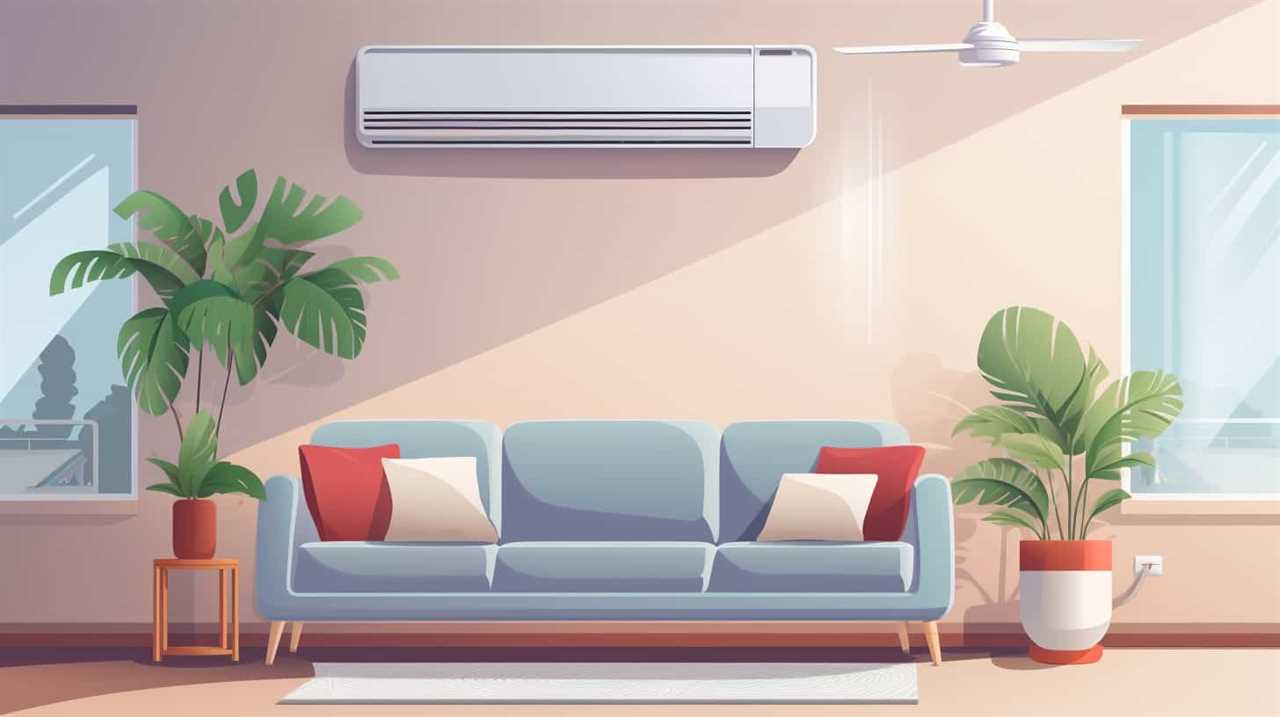
Key Takeaways
- Regular maintenance maximizes efficiency and lifespan of heat pump.
- Cleaning and inspecting the outdoor unit ensures optimal performance.
- Checking and replacing air filters improves indoor air quality and efficiency.
- Lubricating moving parts reduces friction, improves energy efficiency, and extends equipment lifespan.
Importance of Regular Maintenance
Regular maintenance is crucial for maximizing the efficiency and lifespan of your heat pump. By regularly maintaining your heat pump, you can reap numerous benefits and extend the lifespan of your equipment.
Regular maintenance ensures that your heat pump operates at peak performance, resulting in enhanced energy efficiency and reduced energy consumption. This not only helps you save on energy costs but also reduces your carbon footprint, contributing to a greener environment.
Moreover, regular maintenance helps identify and address potential issues before they escalate into major problems, preventing costly repairs or even premature replacement of your heat pump. By investing in regular maintenance, you can enjoy the peace of mind that comes with knowing your heat pump is operating at its best, providing reliable and efficient heating and cooling year-round.
Cleaning and Inspecting the Outdoor Unit
First, we should inspect and clean the outdoor unit of our heat pump to ensure optimal performance. The outdoor unit is exposed to various elements, which can affect its efficiency and lifespan. Regular outdoor unit care is essential to prevent common issues and keep your heat pump running smoothly.
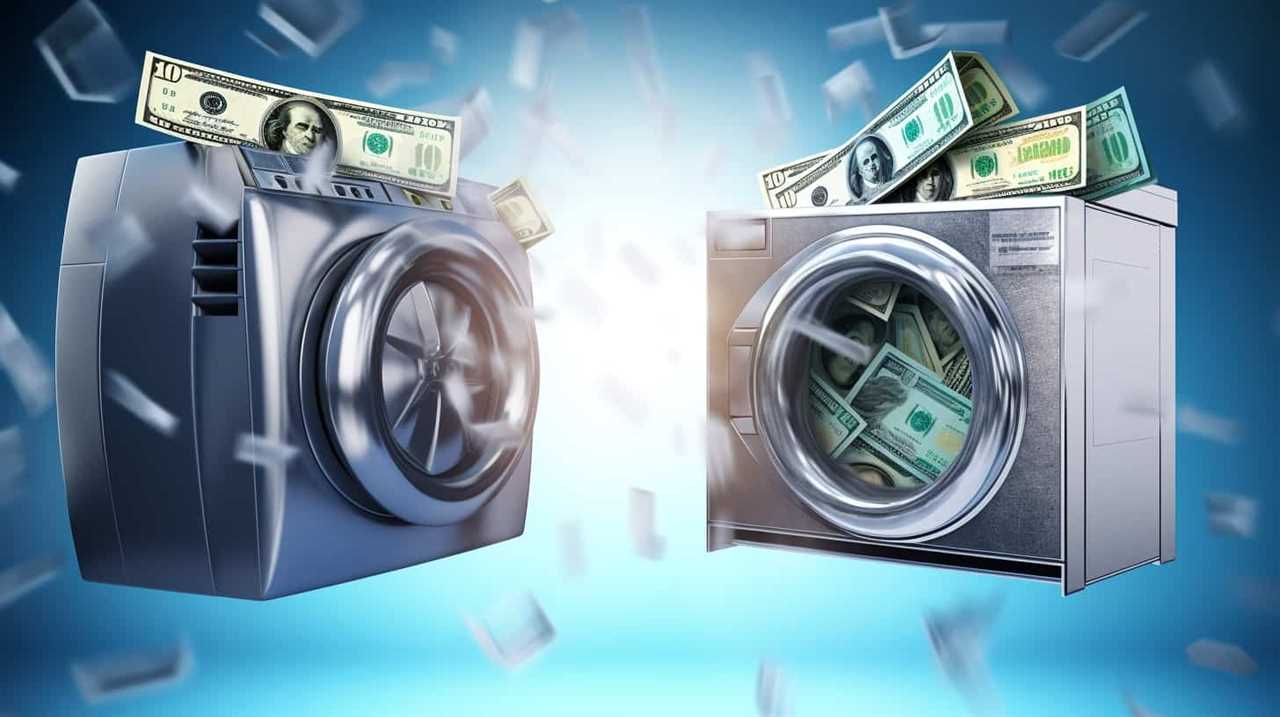
To help you understand the importance of outdoor unit care, here is a table outlining some common issues that can arise and how to troubleshoot them:
| Common Issue | Troubleshooting |
|---|---|
| Reduced airflow | Check for debris blocking the unit or a dirty air filter. Clean or replace as necessary. |
| Noisy operation | Inspect for loose parts or debris. Tighten or remove as needed. |
| Ice buildup | Ensure proper airflow and check for refrigerant leaks. Contact a professional if ice persists. |
| Inefficient cooling/heating | Clean the condenser coils and check for refrigerant leaks. Schedule professional maintenance if needed. |
| Uneven temperatures | Verify the thermostat settings and ensure proper airflow. Adjust if necessary. |
Checking and Replacing Air Filters
Now let’s talk about the importance of clean filters and regular filter replacement when it comes to optimizing your heat pump’s performance.
Clean filters are essential for maintaining good indoor air quality and ensuring efficient airflow throughout the system.
Regularly replacing filters is necessary to prevent clogs and improve the heat pump’s overall efficiency.

Importance of Clean Filters
We should regularly check and replace the air filters in our heat pumps to ensure optimal performance and efficiency. Clean filter maintenance is crucial for several reasons:
-
Improved Indoor Air Quality: Clean filters trap dust, pollen, and other allergens, preventing them from circulating in our homes and improving the air we breathe.
-
Energy Savings: When air filters are clean, our heat pumps can run more efficiently, reducing energy consumption and lowering our utility bills.
-
Extended Lifespan of Equipment: Regular filter maintenance helps prevent dirt and debris from clogging the system, reducing strain on the heat pump and increasing its longevity.
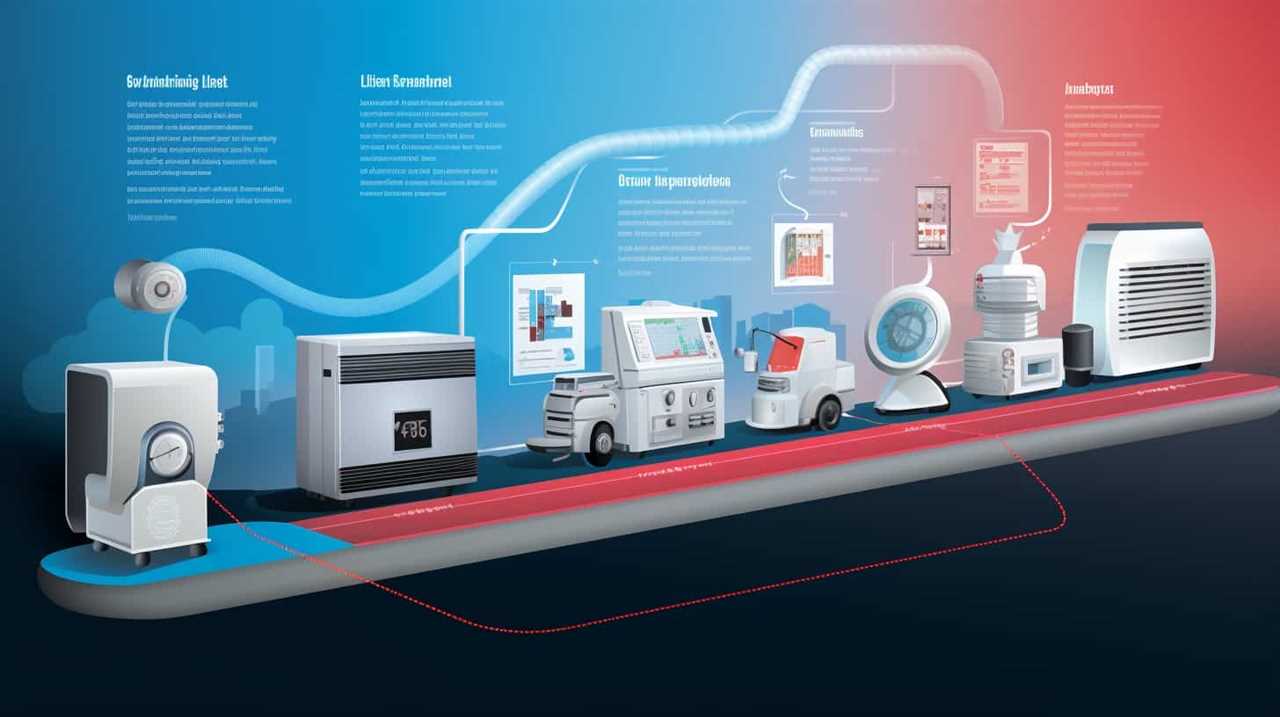
-
Enhanced Comfort: Clean filters allow for better airflow, maximizing the heat pump’s ability to heat or cool our homes effectively.
By prioritizing clean filter maintenance, we can enjoy these benefits and create a healthier and more comfortable living environment.
Now, let’s delve into the importance of regular filter replacement.
Regular Filter Replacement
Our heat pump’s optimal performance and efficiency rely on regularly checking and replacing the air filters. Proper maintenance of the filters is essential to ensure the unit operates smoothly and effectively.
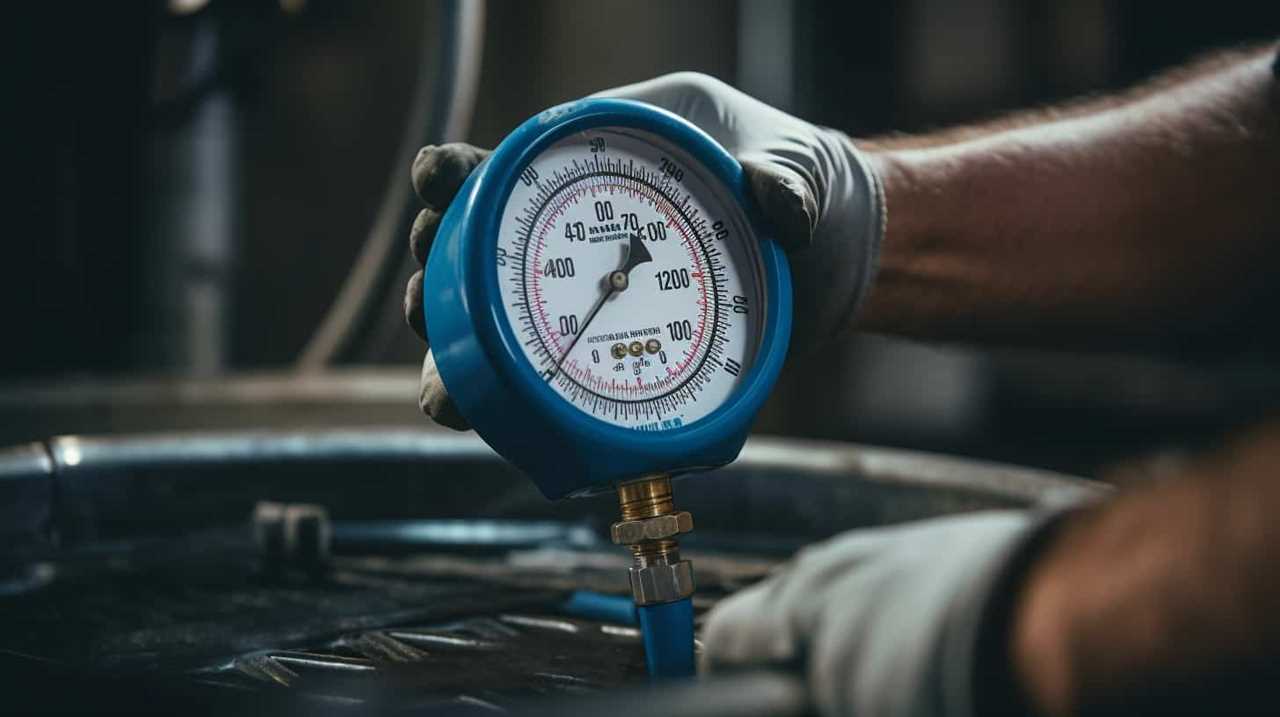
Regular filter replacement offers several benefits, including improved indoor air quality and enhanced energy efficiency. When air filters become clogged, they restrict the airflow, forcing the heat pump to work harder to maintain the desired temperature. This can lead to increased energy consumption and higher utility bills.
Additionally, a clogged filter can cause dust and debris to accumulate in the system, potentially leading to damage and reduced lifespan. By regularly checking and replacing the air filters, you can prevent these issues and ensure your heat pump operates at its best.
For optimal results, consider scheduling professional maintenance to ensure thorough cleaning and inspection of all components.
Lubricating Moving Parts
Regular lubrication is essential for maintaining the optimal performance of your heat pump. Moving parts such as the fan motor and bearings require proper lubrication to reduce friction and prevent wear and tear.
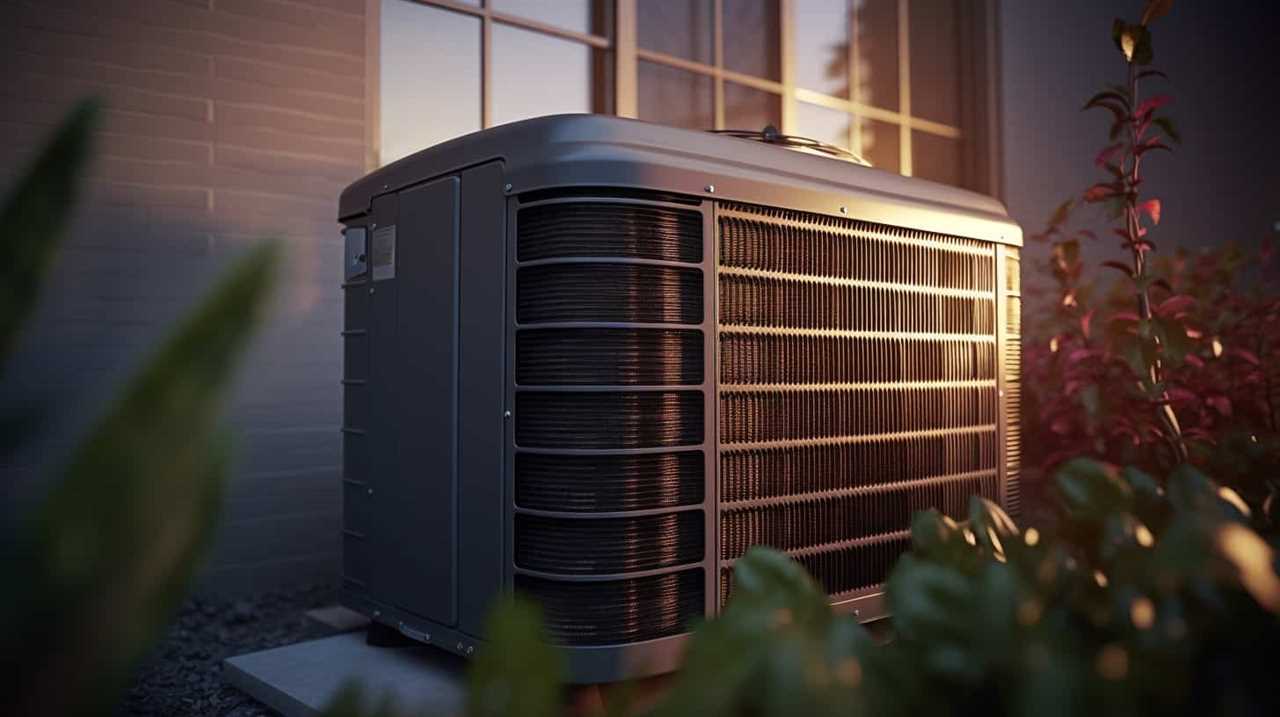
It’s recommended to use high-quality lubricants specifically designed for HVAC systems to ensure smooth operation and extend the lifespan of your heat pump.
Importance of Regular Lubrication
How often should we lubricate the moving parts of our heat pump to ensure optimal performance? Regular lubrication is crucial for maintaining the efficiency and longevity of your heat pump. Here are some key reasons why regular lubrication is essential:
- Prevents friction: Lubricating the moving parts reduces friction, which can lead to wear and tear over time.
- Improves energy efficiency: Proper lubrication ensures smooth operation, reducing energy consumption and saving you money on utility bills.
- Extends equipment lifespan: Regular lubrication helps to prevent excessive strain on the motor and other components, increasing the lifespan of your heat pump.
- Reduces noise: Well-lubricated moving parts produce less noise, creating a more comfortable and peaceful environment in your home.
When it comes to lubrication, it’s important to use the right type of lubricant for your heat pump. Consult the manufacturer’s guidelines or seek professional advice to determine the appropriate lubricant to use.
Remember to also test the thermostat regularly to ensure it’s functioning correctly and maintaining the desired temperature.
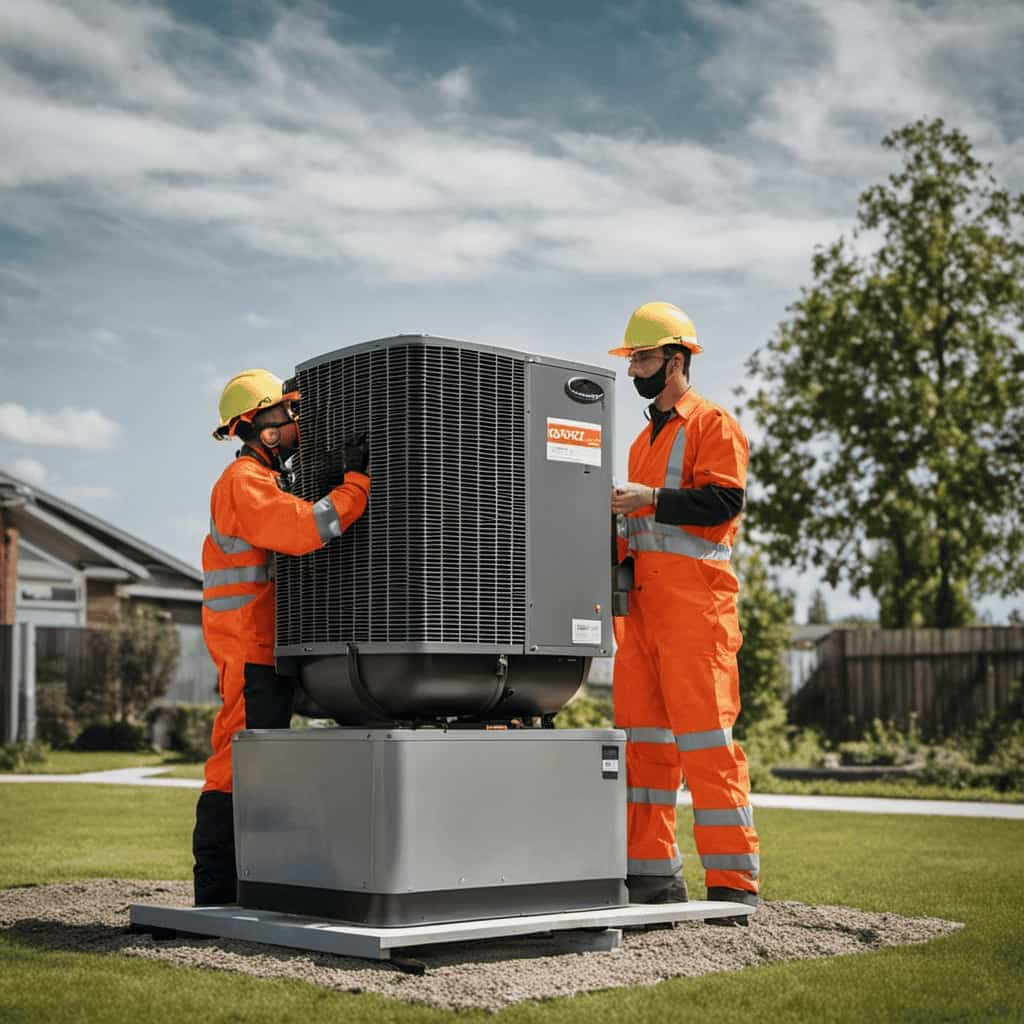
Types of Lubricants Recommended
To ensure optimal performance, we recommend using the appropriate type of lubricant and regularly lubricating the moving parts of your heat pump.
There are various types of lubricants that can be used to maintain the smooth operation of the moving components in your heat pump. One commonly recommended lubricant is a high-quality synthetic oil. Synthetic oils provide excellent lubrication and have a higher resistance to breakdown at high temperatures. They also offer better protection against wear and tear, reducing friction and extending the lifespan of the moving parts.
Another option is a lithium-based grease, which is ideal for lubricating heavy-duty components such as bearings and gears. Lithium-based greases have good adhesive properties, ensuring that the lubricant stays in place and provides long-lasting protection.
It’s important to consult the manufacturer’s recommendations to determine the specific type of lubricant suitable for your heat pump.
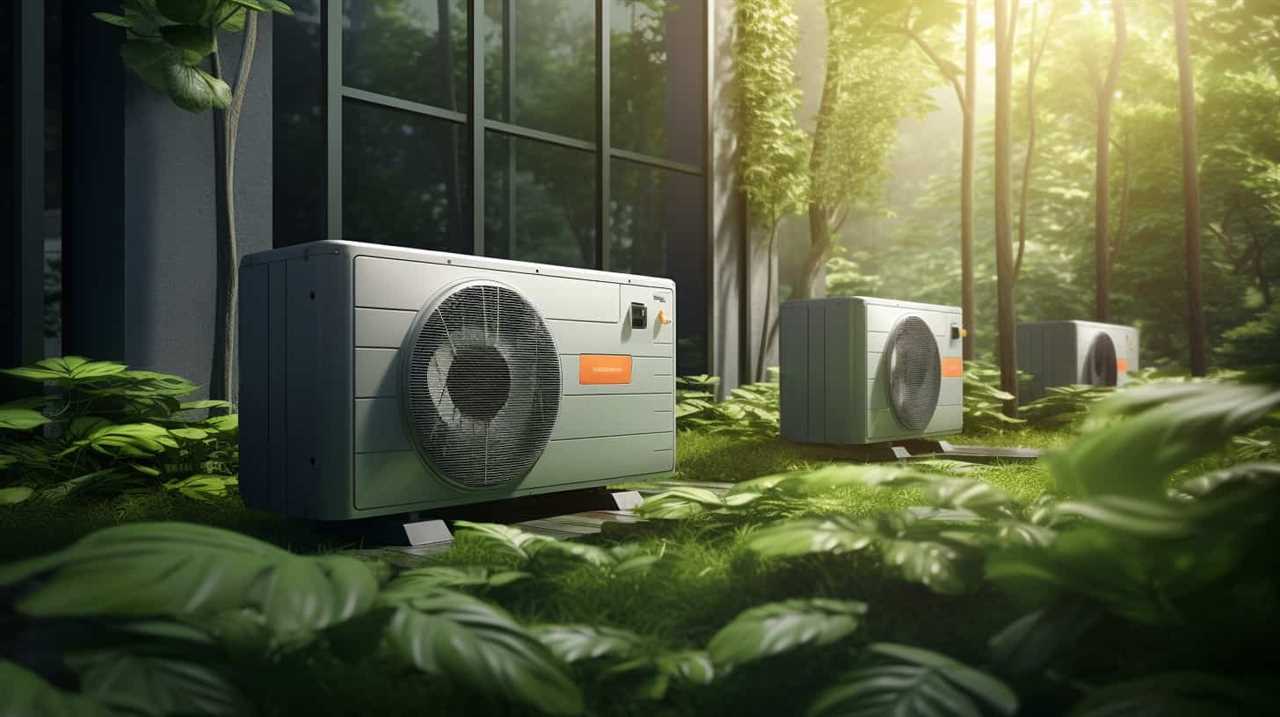
Regularly lubricating the moving parts will help prevent excessive friction, reduce energy consumption, and prolong the life of your heat pump.
Testing and Adjusting Thermostat Settings
We can easily test and adjust the thermostat settings to ensure optimal performance of our heat pump. Here are some important tips to keep in mind:
-
Check the temperature reading: Use a separate thermometer to verify the accuracy of the thermostat’s temperature reading. If there’s a significant difference, the thermostat may need recalibration.
-
Perform a heat anticipator test: This test helps determine if the thermostat is properly calibrated. Adjust the heat anticipator setting and monitor the system’s cycling pattern to achieve the desired comfort level.

-
Troubleshoot wiring issues: Check for loose or damaged wires that may affect the thermostat’s functionality. Ensure all connections are secure and in good condition.
-
Consider programmable thermostats: Upgrading to a programmable thermostat allows for better control and energy efficiency. Take advantage of pre-programmed settings and adjust them to match your schedule.
Inspecting and Cleaning Indoor Coils
To ensure optimal performance, we regularly inspect and clean the indoor coils of our heat pump. Indoor coil efficiency is crucial for the smooth operation of the heat pump and maintaining a comfortable indoor environment. Over time, dust, dirt, and debris can accumulate on the coils, reducing their efficiency and hindering the heat transfer process.
By inspecting and cleaning the coils, we can troubleshoot any potential issues and ensure that the heat pump is operating at its highest efficiency. To clean the coils, we use a soft brush or vacuum to remove any debris and then wipe them down with a damp cloth. It’s important to be gentle and avoid bending the fins during the cleaning process.
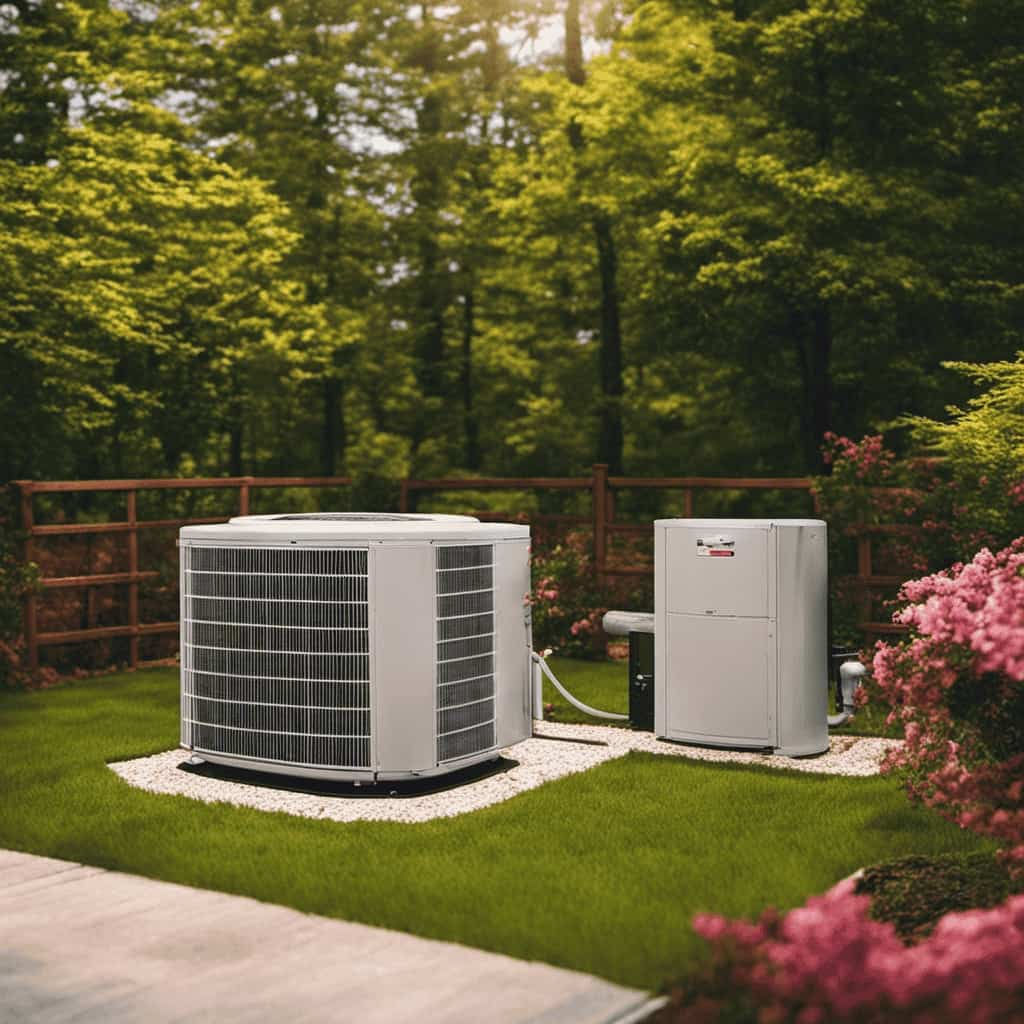
Regular maintenance of the indoor coils is essential for the overall performance of the heat pump.
With the indoor coils inspected and cleaned, the next step in maintaining our heat pump is monitoring refrigerant levels.
Monitoring Refrigerant Levels
To ensure the optimal performance of our heat pump, we regularly monitor and maintain proper refrigerant levels. Monitoring refrigerant levels is crucial for the efficient operation of the heat pump and to prevent any potential issues.
Here are some refrigerant level monitoring techniques that we follow:

- Visual inspection: We visually inspect the refrigerant lines and connections for any signs of leaks or damage.
- Pressure testing: We perform pressure tests to check if the refrigerant levels are within the recommended range.
- Temperature measurement: We measure the temperature of the evaporator and condenser coils to ensure they’re functioning properly.
- Leak detection: We use specialized equipment to detect any refrigerant leaks, such as electronic leak detectors or ultraviolet dye tests.
Signs of refrigerant leaks include reduced cooling or heating performance, hissing or bubbling sounds, or ice buildup on the coils. Regular monitoring helps us identify and address any refrigerant issues promptly, ensuring the smooth operation of the heat pump.
Frequently Asked Questions
How Often Should I Schedule Professional Maintenance for My Heat Pump?
We should schedule professional maintenance for our heat pump regularly to improve its energy efficiency. Regular maintenance has numerous benefits, such as prolonging the lifespan of the heat pump and ensuring optimal performance.
Can I Clean the Outdoor Unit on My Own, or Do I Need to Hire a Professional?
We can clean the outdoor unit ourselves, but hiring a professional has its benefits. DIY cleaning tips include removing debris and cleaning the fins. However, professionals have the expertise to thoroughly clean and inspect the unit, ensuring optimal performance.
What Are Some Signs That Indicate I Need to Replace My Air Filters?
Regularly replacing air filters is crucial for optimal performance. Signs of dirty filters include reduced airflow, increased energy consumption, and poor indoor air quality. Don’t neglect this important maintenance task to ensure a healthy and efficient heat pump system.
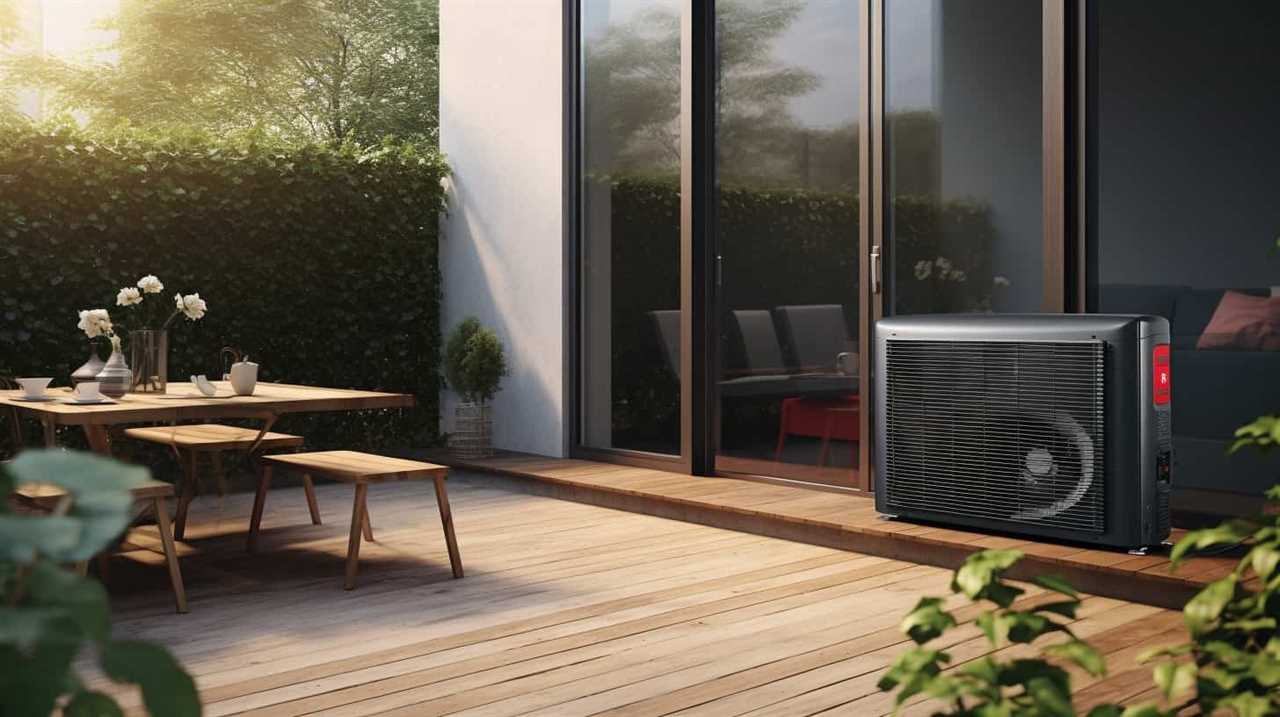
How Often Should I Lubricate the Moving Parts of My Heat Pump?
We recommend lubricating the moving parts of your heat pump every six months. This helps to ensure optimal performance and prolong the lifespan of your system. The best lubricants for heat pump maintenance are silicone-based or synthetic oils.
Is It Necessary to Regularly Monitor the Refrigerant Levels in My Heat Pump?
Regularly monitoring refrigerant levels in our heat pump is necessary. By using refrigerant level indicators, we can ensure optimal performance and efficiency. This maintenance practice helps prevent costly repairs and extends the lifespan of our heat pump.
Conclusion
In conclusion, regular maintenance is essential for optimizing the performance of your heat pump. By cleaning and inspecting the outdoor unit, checking and replacing air filters, lubricating moving parts, testing and adjusting thermostat settings, and inspecting and cleaning indoor coils, you can ensure that your heat pump operates efficiently.
Additionally, monitoring refrigerant levels is crucial for preventing any potential issues.

Are you ready to give your heat pump the care it deserves for optimal performance?









